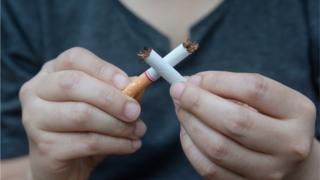More schoolchildren ‘rejecting cigarettes’
 Image copyright Getty Images
Image copyright Getty Images Secondary-school pupils in England appear to be rejecting cigarettes in greater numbers than ever before.
The most recent survey in a series that began in the 1980s indicates just 16% of the pupils have ever smoked tobacco, down from 19% in 2016 and 49% in 1996.
However, a quarter of the 13,000 pupils surveyed, from 193 schools across England, have tried drugs.
This includes nitrous oxide, known as laughing gas, as well as cannabis.
The 2018 survey also shows:
- 17% overall – and 38% of the 15-year-olds and 2% of the 11-year-olds – usually drink alcohol at least once a month
- 6% drink at least once a week
- 13% overall – and 30% of the 15-year-olds – think it is OK to try cannabis
- 25% had used e-cigarettes, the same proportion as in 2016
NHS Digital, which compiled the statistics, said the findings showed half of the young people who had recently either drunk alcohol, smoked cigarettes or taken drugs experienced low levels of happiness.
Why are fewer young people smoking?
It appears the years of public health campaigns highlighting the dangers of smoking cigarettes may be having an impact, and attitudes towards smoking have changed.
Cigarettes have also become harder for young people to buy in more recent years.
The proportion of pupils in the survey who said they managed to buy cigarettes from shops fell from 46% in 2014 to 23% in 2018.
Seven in 10 of those who called themselves current smokers said they got their cigarettes from friends or a family member.
Those who had smoked at any point were much more likely to also have ever used an e-cigarette, compared to those who had never smoked.
Regular e-cigarette use was 6% in 2018.
Deborah Arnott, Chief Executive of the charity Action on Smoking and Health said: “The proportion trying e-cigarettes has not increased and vaping remains largely concentrated among those who are already smokers.
“This provides reassurance that our regulations are working and vaping has not become the “super-cool” phenomenon among young people in England that it is said to be in the USA.”

